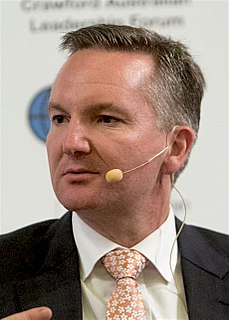A Quote by Dana Rohrabacher
In the meantime, we see there are charities that spend much of their scarce resources that should be going directly to the children to overcome this gulf that separates them from both the donors and the needy.
Related Quotes
When you think of all the conflicts we have - whether those conflicts are local, whether they are regional or global - these conflicts are often over the management, the distribution of resources. If these resources are very valuable, if these resources are scarce, if these resources are degraded, there is going to be competition.
It is evident that many wars are fought over resources which are now becoming increasingly scarce. If we conserved our resources better, fighting over them would not occur ... protecting the global environment is directly related to securing peace. Those of us who understand the complex concept of the environment have the burden to act. We must not tire, we must not give up, we must persist.
We tell the for-profit sector, 'Spend, spend, spend on advertising until the last dollar no longer produces a penny of value,' but we don't like to see our donations spent on advertising in charity. Our attitude is, 'Well look, if you can get the advertising donated (at four o'clock in the morning) I'm okay with that, but I don't want my donation spent on advertising, I want it to go to the needy,' as if the money invested in advertising could not bring in dramatically greater sums of money to serve the needy.
Pro-choice and pro-life activists live in different worlds, and the scope of their lives, as both adults and children, fortifies them in their belief that their own views on abortion are the more correct, the more moral, and more reasonable. When added to this is the fact that should 'the other side' win, one group of women will see the very real devaluation of their lives and life resources, it is not surprising that the abortion debate has generated so much heat and so little light.
It is terrible that we all die and lose everything we love; it is doubly terrible that so many human beings suffer needlessly while alive. That so much of this suffering can be directly attributed to religion—to religious hatreds, religious wars, religious delusions and religious diversions of scarce resources—is what makes atheism a moral and intellectual necessity.
Money is meant not for hoarding, but for using; the aim of life should be to use it in the right way - to spend as much as we can lawfully spend, both upon ourselves and others. And sometimes it is better to do this in our lifetime, when we can see that it is well spent, than to leave it to the chance spending of those that come after us.
The time-use studies also show that employed women spend as much time as nonworking women in direct interactions with their children. Employed mothers spend as much time as those at home reading to and playing with their young children, although they do not, of course, spend as much time simply in the same room or house with the children.
Our supplies of natural resources are not finite in any economic sense. Nor does past experience give reason to expect natural resources to become more scarce. Rather, if history is any guide, natural resources will progressively become less costly, hence less scarce, and will constitute a smaller proportion of our expenses in future years.
































